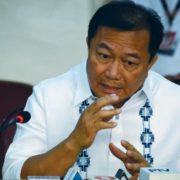According to House Speaker Pantaleon Alvarez, the eight Supreme Court justices who voted to grant the quo warranto petition to invalidate the 2012 appointment of Chief Justice Maria Lourdes Sereno cannot be impeached.
“I don’t think so, in exercise of kasiseparation of powers ehthey acted within their powers as provided for by the Constitution,” Alvarez said.
Alvarez was among the first to suggest the idea of ousting Sereno through quo warranto when the impeachment proceedings against the former chief justice showed that she did not completely file her Statements of Assets, Liabilities, and Net worth (SALN) to the Judicial and Bar Council during 2012 Chief Justice vetting.
Sereno’s allies have asked the House to send the impeachment complaint to the Senate for trial. They are also asking the House to impeach the eight justices — Associate Justices Noel Tijam, Teresita Leonardo-de Castro, Samuel Martires, Andres Reyes Jr., Alexander Gesmundo, Lucas Bersamin, Diosdado Peralta and Francis Jardeleza — for granting the quo warranto petition brought by Solicitor General Jose Calida.
Retired Chief Justice Hilario Davide Jr. said on Thursday, May 17, that “the mere act of voting to oust the Chief Justice in gross and culpable violation of the Constitution will itself be a basis to charge them of an impeachable offense—culpable violation of the Constitution.”
Alvarez, however, does not agree.
He repeated his position in the past that impeachment presupposes a valid appointment. He also added that a quo warranto maybe used against those whose appointments were invalid.
He thumbed down a proposal to empower the Supreme Court to try justices who are the subject of impeachment by the consultative committee.
Impeachment proceedings may be initiated against impeachable officials like the justices of the court, at the House and if one-third of the congressmen support it, the Senate may try the official for removal from office under the 1987 Constitution.
The constitutional commission is considering that the impeachment of justices under a new constitution be initiated instead together by the House and Senate, with a trial to be done by a proposed constitutional court which will be a strictly judicial proceeding.






